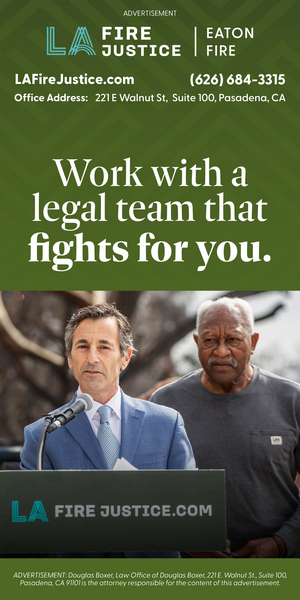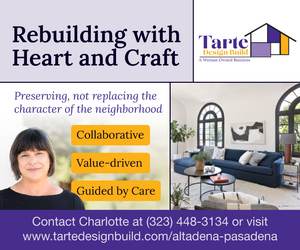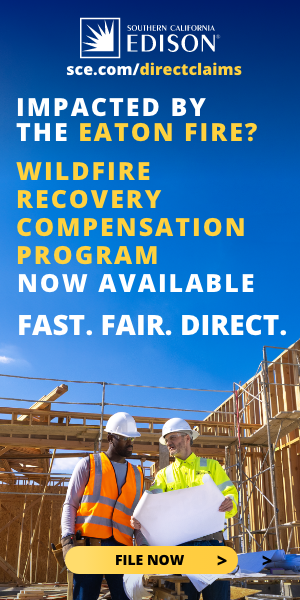Altadena Now is published daily and will host archives of Timothy Rutt's Altadena blog and his later Altadena Point sites.
Altadena Now encourages solicitation of events information, news items, announcements, photographs and videos.
Please email to: Editor@Altadena-Now.com
- James Macpherson, Editor
- Candice Merrill, Events
- Megan Hole, Lifestyles
- David Alvarado, Advertising


Monday, September 8, 2025
In Altadena, a Cash-First Model Lets Survivors Decide How to Spend

Altadena Town Council Members at top left, Altadena resident GoFundMe Chief Executive Officer Tim Cadogan of GoFundMe, an Altadena resident whose home burned down.
Eight months after the Eaton Fire tore through the foothills of Altadena, families are using modest relief grants for the basics — gas, rent, even fall school clothes — under a “dignity-based” model that lets survivors decide how best to spend the money.
The grants come from the Altadena Eaton Fire Relief Fund, a community-run initiative born in the wake of the January 7 wildfire.
Set up in February by the Altadena Town Council in partnership with GoFundMe.org, the fund is testing a philosophy of disaster aid rarely tried at scale: unrestricted cash assistance.
Applications opened June 25 and closed July 6, drawing more than 3,000 submissions, nearly two-thirds of them in just two days.
The first round reached 350 households, with grants generally between $500 and $1,000. Organizers plan another round of distributions later this month, with awards designed to range from $500 to $5,000 per household.
Applicants must state what the grant is needed for; once need is established, spending is unrestricted.
“What dignity based means is that people could assess their own needs, and as long as they told us what it was needed for … and how they were going to use the cash, then they could go ahead and use it for whatever they saw fit,” said Milissa Marona, the Town Council treasurer and co-chair of the fund.
The examples are everyday but revealing.
“If they want to use it for gas, that’s fine. If they want … use it for going to Target and buying their kids’ fall school clothes. If they want to use the aid for whatever, then they’re able to make their own decisions. And I think that gives people back their own dignity.”
Tim Cadogan, chief executive officer of GoFundMe and an Altadena resident who lost his home in the fire, framed the approach in terms of control and expertise.
“The cash is tremendously important, and it also gives people agency and dignity to make their own choices as to what they need.” He added, “Cash is a really important part of that because people are the experts in their own lives and they are able to use the cash to address needs that they really understand better than anybody else.”
Even so, the scale of loss in Altadena is so stark. More than 2,386 written testimonies accompanied the applications, describing families forced into serial moves, renters without insurance, artists and small businesses whose work evaporated, and members of recovery communities who lost both shelter and support.
According to a UCLA study, nearly 48% of Black households in Altadena were destroyed or sustained major damage — underscoring a disproportionate toll that local leaders say continues to shape displacement and access to aid.
Council Member Marona said the basic costs of patching together a life at a distance have surprised many.
“The thing that is most surprising to me is that people very much need the basic necessities of life, food, rent, clothing, gas money. They’re now living so far away, they’re commuting back and forth.”
She added that she had encountered people who had cycled through 10 to 15 housing arrangements since January and others who lost jobs amid post-fire trauma.
The fund’s structure is deliberately lean: it operates under GoFundMe.org’s nonprofit umbrella, with decisions routed through a local advisory committee to keep overhead low and accountability close to the fire zone.
It sits alongside other noble efforts — the Pasadena Community Foundation’s fund for nonprofit grants, the NAACP’s initiative for uninsured or underinsured Black homeowners, and the American Red Cross bridge program — but distinguishes itself by its hyperlocal focus and flexibility.
“Unfortunately, there’s probably always more need than there are means in a situation like this,” Cadogan said.
The Town Council is reportedly preparing a second distribution this month and coordinating with newly formed long-term recovery groups for case management. Organizers are clear that cash alone does not resolve recovery; rather, they say, modest, fast and flexible grants can buy time and restore a measure of control to households navigating upheaval.
Altadena Calendar of Events
For Pasadena Events, click here









